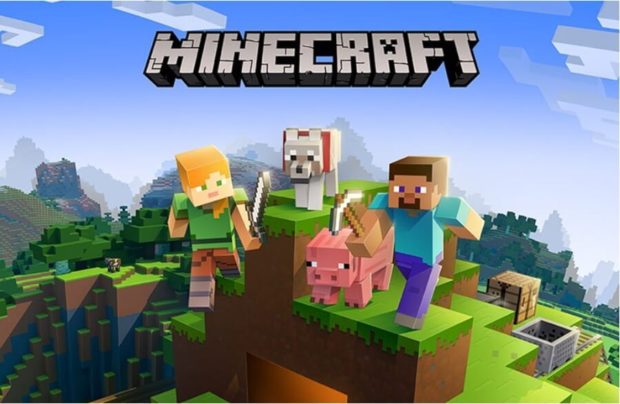How Minecraft became R-rated game in S. Korea

Minecraft Photo by Microsoft via The Korea Herald/Asia News Network
SEOUL — Minecraft is a 3D computer game where players can build anything. Often described as “online Legos,” the bestselling video game of all time involves building blocks and creating structures across different environments and terrains.
Rated as suitable for ages 7 and up, some schools have started to incorporate Minecraft into the classroom, as kids can naturally learn teamwork, problem-solving skills and basic programming while playing the game with friends and helping each other build new creations.
In South Korea, however, the rather harmless game developed by Mojang Studios in 2009 is now only available for players 19 years of age and older.
Frustrated users are directing their anger at the country’s “shutdown law,” which blocks children under the age of 16 from playing online video games between midnight and 6 a.m. to protect them from side effects of playing games late at night and losing sleep.
The “Cinderella law,” in effect since 2011, is the root cause of their being denied access to Minecraft, they say in an online petition filed Friday to the presidential office of Cheong Wa Dae.
“Korea’s game market is at the risk of being the world’s only place where Minecraft is labeled as an adult game,” the petition said, calling for the abolition of the law. As of Sunday morning, it had garnered support of over 15,000 Koreans.
Some context is needed to understand what happened to teen users of Minecraft.
When Korea introduced the game regulation back in 2011, it posed technical challenges to global game companies. Establishing a new system that can filter out users of a certain age at a certain period of time in Korea might cause irrevocable damage to old servers.
Instead of launching new servers dedicated to Korea, Microsoft simply changed its policy in 2012 and asked Korean users to certify through Xbox Live — Microsoft’s online service for gaming — that they are 19 years or older if they want to play Microsoft games.
After Microsoft acquired Mojang Studios in 2014, it allowed users of Minecraft Java Edition to access the game through their Mojang Studios accounts rather than Xbox Live. That’s how Korean teen users have been accessing the game so far.
A problem arose in December when Microsoft started to require Xbox Live accounts to play Minecraft Java Edition due to security issues, asking global users to migrate their Mojang Studios accounts to Xbox Live. Microsoft apparently did not realize the ramifications for Korean users.
By making Minecraft Java Edition playable through Xbox Live accounts, which require users in Korea to certify that they are 19 years or older, the game suddenly became de facto R-rated in the country overnight.
While the migration is currently underway on a voluntary basis globally, Microsoft ended the grace period for Korean users recently and posted a notice on the official Minecraft website that says, “For players in South Korea, you must be 19 years of age or older to purchase and play the Java edition of Minecraft.”
Over the controversy, the Ministry of Gender Equality and Family, who played a central role in the introduction and the passage of the Cinderella law, argues that Microsoft is to blame.
Microsoft’s management policy is the problem, it claims.
“Any responsible game company should make adjustments to different systems of different countries when it makes a policy change and make investments to protect its users,” a ministry official said.
The efficacy of the Cinderella law has been challenged multiple times over the last decade.
According to a report written by the National Assembly’s Fourth Industrial Revolution Committee in 2019, the Cinderella law increased the sleeping time of adolescents by only 90 seconds.
A report titled “2020 Game User Panel Survey” released by the Korea Creative Content Agency in May suggests that “the shutdown system requires a review in terms of efficacy as there is no correlation between game play time and sleeping time.”
The report adds that the shutdown system, which only applies to computer games, has limits as 91 percent of Korean game users are mobile game users.
Lawmakers from both sides of the aisle are working to scrap the Cinderella law. Rep. Jeon Yong-gi and Rep. Kang Hoon-sik from the ruling Democratic Party of Korea last month each proposed a revision of the shutdown law. Jeon wants to kill the shutdown system once and for all, while Kang intends to maintain the system but let parents invoke it on a voluntary basis.
Rep. Her Euna from the main opposition People Power Party and Rep. Ryu Ho-jeong of the liberal minor Justice Party are scheduled to propose a revision together this month.
“How much time children play games must be decided by a conversation between parents and their kids,” Her said.
Ironically, President Moon Jae-in and first lady Kim Jung-sook celebrated Children’s Day on May 5 last year by filming a video in Minecraft. The video posted on YouTube shows President Moon and his wife guiding children on a virtual tour of Cheong Wa Dae.